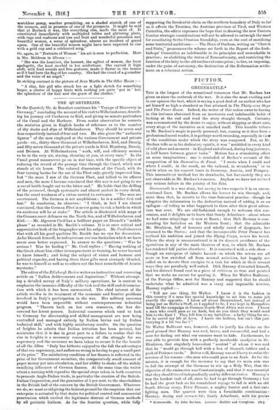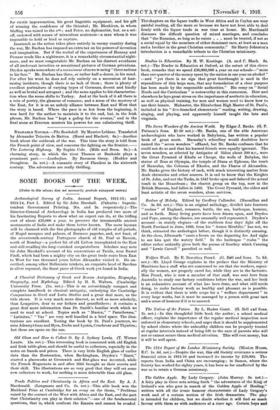FIC T I'0 N.
GREEN3LANTLE.*
Tuts is the longest of the sensational romances that Mr. Buchan has given us since the outbreak of the war. It is also the most exciting and in our opinion the best, which is saying a good deal of an author who has set himself so high a standard as that attained in The Thirty-nine Steps and The Power House. Indeed, the writer of this notice owns to having in this instance abstained from an inveterate and indefensible habit of looking at the end and read the story straight through. Curiosity was overmastered by the desire to enjoy, without skipping or short-cute, every stage of the narrative as it unrolled itself. This humble tribute to Mr. Buchan's magic is purely personal, but, coming as it does from a professional novel-reader, it is perhaps worth recording, especially in view of the conditions under which the story was composed. For, as Mr. Buchan tells us in his dedicatory epistle, it was " scribbled in every kind of odd place and moment—in England and abroad, during long journeys, in half-hours between graver tasks." Motion has a stimulating effect on some imaginations : one is reminded of Berlioz's account of the composition of his Damnation de Faust. "I wrote when I could and where I could ; in the coach, on the railroad, in steamboats," or in hotels when on his concert tours in Germany, Austria, and Hungary. This intermittent method has its drawbacks, but fortunately they aro not observable in Mr. Buchan's romance. Anyhow we have not noticed any serious failure in the joining of his flats.
Greeninantle is a war story, but saving in two respects it is on uncon- ventional lines. Mr. Buchan allows his heroes to win through, and, more than that, he reverts to the time-honoured practice—though he relegates the information to tho dedication instead of adding it as an epilogue—of telling us what happened to them after their great adven- ture was over. We are old-fashioned enough to welcome this con- cession, and it delights us to learn that Sandy Arbuthnct—about whom we had some misgivings—is now at Basra ; that Dick Hannay is com- manding his battalion on the Western front ; that the admirable Mr. Blenkiron, full of honours and wholly cured of dyspepsia, has returned to the States ; and that the incomparable Peter Pionaar has realized his ambition and joined the Flying Corps, mines his beard. Where the story is unconventional is in its discreet avoidance of the operations in any of tho main theatres of war, to which Mr. Buchan has rendered full justice elsewhere. It is concerned with a side-show- - though an enterprise of infinite hazard—in which the actors are all more or less switched off from normal activities, but happily are called on to devote their energies to a task for which in their several ways they arc peculiarly well suited. Dick Hannay distrusted himself, and his distrust found vent in a piece of criticism so true and pointed that we make no excuse for quoting it. When Sir Walter Bullivant, of the Foreign Office, sent for Hannay and suggested that he should undertake what ho admitted was a crazy and impossible mission, Hannay replied :-
"Tell me one thing, Sir Walter. I know it is the fashion in
this country if a man has special knowledge to set him to some job exactly the opposite. I know all about Damaraland, but instead of being put on Botha's Staff, as I applied to he, I was kept in Hampshire mud till the campaign in German South-West Africa was over. I know a man who could pass as an Arab, but do you think they would send him to the East ? They left him in my battalion—a lucky thing for me, for he saved my life at Loos. I know the fashion, but isn't this just carrying it a bit too far 1" Sir Walter Bullivant was, however, able to justify his choice on the good ground that Hannay was cool, brave, and resourceful, and had a nose for finding out what our enemies want to hide. Furthermore, he was able to provide him with a perfectly invaluable ooadjutor in Mr. Blenkiron, that singularly benevolent " nootral " of whom it was said that he " would go through hell with a box of bismuth tablets and a pack of Patience cards." Bettor still, Hannay was at liberty to enlist the services of his rescuer—the man who could pass as an Arab. As for the mission, it is enough for the reviewer to say that its main aim was to foil the attempt of the Germans to stir up a Holy War, that the objective of the emissaries was Constantinople, and that it was essential that they should travel independently and by different routes. Hannay's was the hardest task of all, since he had to go through Germany ; but he had the great luck on his roundabout voyage to fall in with an cdil South African crony, Peter Pienaar, a mighty hunter and a first-rate
fighting man. The quartet were thus a formidable combination : Hannay, daring and resourceful; Sandy Arbuthnot, with his genius • Gresnownik. By John Berhan. London: Hodder and fiteuitton. Os.)
for exotic impersonation, his great linguistic equipment, and his gift of winning the confidence of the Oriental ; Mr. Blenkiron, in whom bluffing was raised to the nth; and Peter, no diplomatist, but, as a set- off, endowed with senses of miraculous acuteness—a man whom it was impossible to hold or bind or capture.
Inasmuch as the action takes place entirely in enemy country during the war, Mr. Buchan has imposed an extra tax on his powers of invention and imagination. But if the recital of the experiences of Hannay and Pienaar reads like a nightmare, it is a remarkably circumstantial night- mare, and we must congratulate Mr. Buchan on his discreet avoidance of all irrelevant invective or sensational pictures of German privations. Dryden speaks somewhere of a connoisseur of news wearing " three nations in his face." Mr. Buchan has three, or rather half-a-dozen, in his mind. For after his wont ho does not rely entirely on a succession of hair- raising incidents, though there is no lack of them ; there is plenty of excellent portraiture of varying types of Germans, decent and kindly as well as brutal and arrogant ; and the same applies to his characteriza- tion when the scene shifts to Turkey. And at the back of it all there is a vein of poetry, the glamour of romance, and a sense of the mystery of the East, for it is on an unholy affiance between East and West that the story is based. Where the pace is so hot from the beginning, it was hard for the author to maintain it to the end, but, in the Irish phrase, Mr. Buchan has " kept a gallop for the avenue," and in the final scene at Erzerum musters his powers for one culminating thrill.















































 Previous page
Previous page